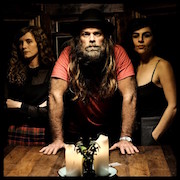As with most of his devotees, my first rendezvous with Austin-based musician, painter, and artisan Thor Harris came during one of those earlier tours of Swans’ latest incarnation. As the band performed their driving, deliriously ritualistic music – a sound that would later materialise in the form of their masterpiece, The Seer – my attention constantly drifted towards the corner of the stage. There, surrounded by an instrumentarium of idiosyncratic, self-made percussive elements, gongs, and chimes, stood a Herculean, brutish silhouette – a distorted enigma at odds with reality. Through each swing of his mallets and drumsticks spun traces of a naturalistic charisma that threatened to eclipse even the all-encompassing dark aura of the monolithic Michael Gira.
Though one expects an equally peculiar psyche behind such a strong physical presence, the essential form of Thor Harris’s mosaic has been gradually revealing itself over years. While audiences and fans will always create idealised images of their icons, rarely accurately depicting an individual’s inner states, in the case of Thor Harris there is no hidden persona: his thoughts and emotions are laid bare with each endeavour. Whether it’s his continued appreciation of the preciousness of the most mundane things in life—hand dryers and manhole covers chiefly—or the books and theatrical performances that provide insight into the deepest and most painful crevices of a mind battling with depression, the essence of a magnanimous, creative human being is evident.
To understand Thor Harris, then, is to understand the art of Thor & Friends, his first outing as bandleader. The group’s self-titled record is a work born out of Harris’ binding perception of friendship and a return to the communal origins of music. This is reflected in the patchwork made of a varied cast from his hometown—the core of Peggy Ghorbani and Sarah “Goat” Gautier is joined by Jeremy Barnes and Heather Trost of A Hawk and A Hacksaw, John Dieterich of Deerhoof, and Raven—who interact with Harris’ compositions through playing, pristine ideas, and production. But unlike his contributions to some of the best releases of recent years (Shearwater, Ben Frost, Jenny Hval, Bill Callahan, etc.), Thor & Friends is dominantly a projection of Harris’ sensibilities and handcrafted philosophy, rather than a formulaic, conceptual creation.
The album is thus a partly composed, partly improvised work of percussion-focused “avant-chamber” that feels secluded from current trends, instead existing in a flux between American Minimalism – especially Terry Riley – a deep love of The Necks’ circling and restless approach, folk sentiments, and fragments grasped from musicians that Harris has collaborated with in the past. For the most part, it makes for a warm and gentle affair that varies its step but never strays too far from the axis of polyrhythmic xylophone and marimba beats around which strings, guitars, and electronic effects dance and twirl. The compositions develop patiently and instinctively, without overthinking their path, and repeat meditative passages reverently. At the same time, as if mimicking Harris’ own struggles, the tracks fluctuate between moods, never settling in, and are often tinged with an undertone of sweet melancholy and nostalgia.
Like Harris himself, the album refuses to hide its personality: the opener, ‘White Sands’, captures the spirit of the record in its entirety. What starts as a deceptively timid and slow piece, driven by lazily rolling xylophones and marimbas, is suddenly shaken by a sweeping, ominously thunderous concoction of bowed textures. The dissonant strings are displaced and aggressive, drawing a sharp contrast to the soft, organic feel of the unrelenting percussive twangs. Because of the intensity of this tune, the transition into the soothing Balearic sounds of ‘Whose Fingers’ comes as a surprise, with a succulent bass line leading the whirlwind of percussion and muted guitar plucks, while a harmonica faintly flutters in the background. It’s a cut that manifests a secret, heartening crescendo of exhilaration.
That same sense of naively joyful, yet pensive beauty permeates the album. The heterogeneous rhythmic and melodic threads intersect, voices clash and harmonise on ‘12 Ate’, a Tiersen-esque harmonica waves on ‘Crusades’, and a lullaby-like atmosphere and spartan minimalism are featured on ‘Slow Prisoner’. Then a stirring shift occurs: just as the haunting ‘Lullaby for Klaus’ and its rumbling woodwinds—an ingredient from Blixa Bargeld’s songbook—morph into the tender and soulful ‘Jordan’s Song’, dictated by an undulating resonance meshed with diffused vocal expanses.
As a whole, Thor & Friends functions as yet another window into Thor Harris’ world, a new method of connecting with him and others. Impervious to overanalysing and methodical categorisation, this music is a living and pulsing thing, perfect in its imperfections, as much as the concept of togetherness behind it. If you listen carefully, you can hear the movements and rustle of the performers. The humanity of it all.


